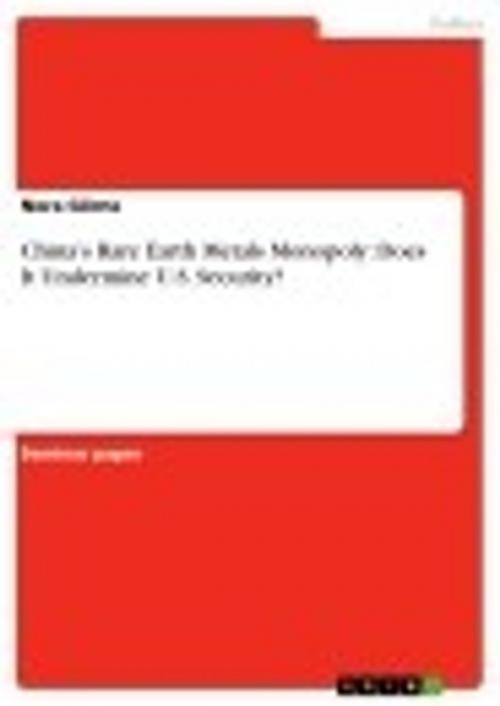China's Rare Earth Metals Monopoly: Does It Undermine U.S. Security?
Nonfiction, Social & Cultural Studies, Political Science, International, International Security| Author: | Nora Görne | ISBN: | 9783656213956 |
| Publisher: | GRIN Verlag | Publication: | June 11, 2012 |
| Imprint: | GRIN Verlag | Language: | English |
| Author: | Nora Görne |
| ISBN: | 9783656213956 |
| Publisher: | GRIN Verlag |
| Publication: | June 11, 2012 |
| Imprint: | GRIN Verlag |
| Language: | English |
Seminar paper from the year 2012 in the subject Politics - International Politics - Topic: Peace and Conflict Studies, Security, grade: A-, Utrecht University (Roosevelt Academy), course: Security in the Post-Cold War Era, language: English, abstract: Rare earth metals are chemical elements which are widely unknown to the general public but nevertheless can be found in everyday life. They are critical components of digital cameras, rechargeable batteries and magnets, of surgical lasers, polishing powders and military tanks. Even though their name suggests differently, they are not specifically rare but they often only exist in small deposits scattered over the globe which makes mining often fairly unprofitable. From 1986 onwards China established itself as the biggest producer of rare earth metals with by 2010 supplying 97% of world demand (Humphries, 2011, p. 13). In the past five years prices have been seen to increase tremendously and during the Senkaku boat collision incident, China imposed a trade embargo for rare earth metals against its opponent Japan. The question is to what extent China is going to use its dominant position in the future, specifically in regard to one of the biggest rare earth metal consumer, the United States. In the following the question whether China's monopoly is indeed a serious threat to U.S. security will be answered. Therefore, first a detailed definition of rare earth metals and their applications and a historical overview will be given. Thereupon, it will be shown that China's monopoly is indeed a security issue by a review of the relevant body of security literature, specifically the Copenhagen school approach. Afterwards the possible solutions will be examined.
Seminar paper from the year 2012 in the subject Politics - International Politics - Topic: Peace and Conflict Studies, Security, grade: A-, Utrecht University (Roosevelt Academy), course: Security in the Post-Cold War Era, language: English, abstract: Rare earth metals are chemical elements which are widely unknown to the general public but nevertheless can be found in everyday life. They are critical components of digital cameras, rechargeable batteries and magnets, of surgical lasers, polishing powders and military tanks. Even though their name suggests differently, they are not specifically rare but they often only exist in small deposits scattered over the globe which makes mining often fairly unprofitable. From 1986 onwards China established itself as the biggest producer of rare earth metals with by 2010 supplying 97% of world demand (Humphries, 2011, p. 13). In the past five years prices have been seen to increase tremendously and during the Senkaku boat collision incident, China imposed a trade embargo for rare earth metals against its opponent Japan. The question is to what extent China is going to use its dominant position in the future, specifically in regard to one of the biggest rare earth metal consumer, the United States. In the following the question whether China's monopoly is indeed a serious threat to U.S. security will be answered. Therefore, first a detailed definition of rare earth metals and their applications and a historical overview will be given. Thereupon, it will be shown that China's monopoly is indeed a security issue by a review of the relevant body of security literature, specifically the Copenhagen school approach. Afterwards the possible solutions will be examined.















